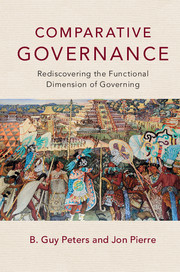Book contents
- Frontmatter
- Contents
- Preface
- 1 The Governance Problem
- 2 The Theory of Governance
- 3 Decision–Making: The Essence of Governing
- 4 Governance and Comparative Politics
- 5 The Institutional Politics of Inter–governmental Relationships
- 6 Implementation, Administration, and Governance
- 7 Governance Failure, Functional Failure, and State Failure
- 8 The Change of Governance and the Governance of Change
- 9 Conclusions: Governance, Functionalism, and Comparative Politics
- References
- Index
1 - The Governance Problem
Published online by Cambridge University Press: 05 September 2016
- Frontmatter
- Contents
- Preface
- 1 The Governance Problem
- 2 The Theory of Governance
- 3 Decision–Making: The Essence of Governing
- 4 Governance and Comparative Politics
- 5 The Institutional Politics of Inter–governmental Relationships
- 6 Implementation, Administration, and Governance
- 7 Governance Failure, Functional Failure, and State Failure
- 8 The Change of Governance and the Governance of Change
- 9 Conclusions: Governance, Functionalism, and Comparative Politics
- References
- Index
Summary
Governance is about governing, and governing is predominantly about making decisions. This might appear to be a truism, but we assert that much of the governance literature, in general, and the development of governance theory, in particular, have lost perspective on what constitutes the core issue of democratic governance – governing. Equally important, governing frequently means making and enforcing unpopular decisions which require a solid institutional framework and a regulated process. Again, decision-making is at the heart of governing and governance. It is generally acknowledged that governing contemporary society is a more challenging task compared to just a few decades ago as a result of increasing social complexity and globalization. Governments around the world address this complexity by engaging societal partners in the process of governing, but this strategy has entailed complex contingencies related to the organization and management of collaborative forms of governance.
Most academic observers of governance have interpreted these developments as proof of a “shift” in the locus of political power from government to networks and other forms of exchange between state and society. In an effort to produce new analytical models to study the collaborative dimension of governance, most political scientists seem to ignore the fundamental circumstance that the state remains very much at the center of governance. Understanding contemporary governance, we insist, is a matter of understanding the transformation, not elimination, of the state (Bell and Hindmoor, 2009; Pierre and Peters, 2000; Sørensen, 2004). In fact, this book will argue that what is required of governance theory is not further distancing from the state, and with the distancing emphasizing the society-centric approach to governance, but rather the opposite – to probe deeper into the state apparatus to understand how a set of new, or exacerbated, contingencies have changed the preconditions for governing.
It appears to us as if most observers of governance became so intrigued by the emerging role of non-state governance partners that they became oblivious of the continuing role of the state in governance and also of the governance role played by conventional participants in governance, like political parties. The analytical perspective on governance, we suggest, should depart from the institutional capabilities of the state; no other actor in society can challenge the formal political mandate of the state (see Bell and Hindmoor, 2009).
- Type
- Chapter
- Information
- Comparative GovernanceRediscovering the Functional Dimension of Governing, pp. 1 - 19Publisher: Cambridge University PressPrint publication year: 2016



